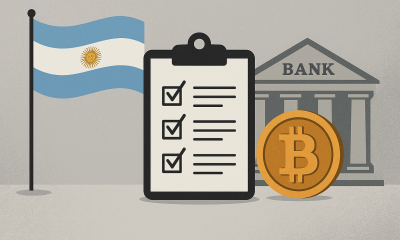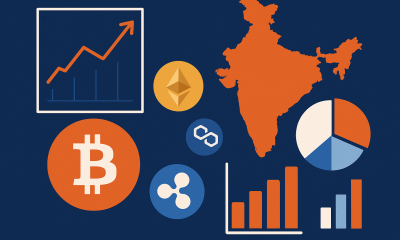

Metaverse
Welcome to the era of AI nationalism – Crypto News
Ever since OpenAI , an American firm, launched ChatGPT, its human-like conversationalist, in November 2022, just about every month has brought a flurry of similar news. Against that backdrop, the three latest announcements might look unexceptional. Look closer, though, and they hint at something more profound. The three companies are, in their own distinct ways, vying to become AI national champions. “We want AI71 to compete globally with the likes of OpenAI”, says Faisal al-Bannai of Abu Dhabi’s Advanced Technology Research Council, the state agency behind the Emirati startup. “Bravo to Mistral, that’s French genius,” crowed Emmanuel Macron, the president of France, recently. ChatGPT and other English-first LLMs “cannot capture our culture, language and ethos”, declared Krutrim’s founder, Bhavish Aggarwal. Sarvam started with Indian languages because, in the words of its co-founder, Vivek Raghavan, “We’re building an Indian company.”
AI is already at the heart of the intensifying technological contest between America and China. Over the past year they have pledged $40bn-50bn apiece for AI investments. Other countries do not want to be left behind—or stuck with a foreign critical technology over which they have little control. In the past year another six particularly AI-ambitious governments around the world—Britain, France, Germany, India, Saudi Arabia and the United Arab Emirates (UAE)—have promised to bankroll AI to the collective tune of around $40bn. Most of this will go towards purchases of graphics-processing units (GPUs, the type of chips that makes AI intelligent) and factories to make such chips, as well as, to a lesser extent, support for AI firms. The nature and degree of state involvement varies from one wannabe AI superpower to another. It is early days, but the contours of new AI-industrial complexes are emerging.
Start with America, whose tech firms give everyone else AI envy. Its vibrant private sector is innovating furiously without direct support from Uncle Sam. Instead, the federal government is spending around $50bn over five years to increase domestic chipmaking capacity. The idea is to reduce America’s reliance on Taiwanese semiconductor manufacturers such as TSMC, the world’s biggest and most sophisticated such company. Supplies from Taiwan could, fear security hawks in Washington, be imperilled should China decide to invade the island, which it considers part of its territory.
Another way America intends to stay ahead of the pack is by nobbling rivals. President Joe Biden’s administration has enacted brutal export controls that ban the sale of cutting-edge AI technology, including chips and chipmaking equipment, to adversaries such as China and Russia. It has also barred Americans from sharing their AI expertise with those countries.
It is now coercing those on the geopolitical fence to fall in line. In October the American government started requiring companies in third countries, including Saudi Arabia and the UAE, to secure a licence in order to buy AI chips from Nvidia, an American company that sells most of them. The rules have a “presumption of approval”. That means the government will “probably allow” sales to such firms, says Gregory Allen, who used to work on AI policy at the Department of Defence—as long, that is, as they do not have close ties to China. On December 6th Peng Xiao, who runs a state-backed AI startup in Abu Dhabi called G42, announced that the company would be cutting ties with Chinese hardware suppliers like Huawei, a Chinese electronics company. “We cannot work with both sides,” he told the Financial Times.
China’s AI strategy is in large part a response to American techno-containment. According to data from JW Insights, a research firm, between 2021 and 2022 the Chinese state has spent nearly $300bn to recreate the chip supply chain (for AI and other semiconductors) at home, where it would be immune from Western sanctions. A lot of that money is probably wasted. But it almost certainly helped Huawei and SMIC, China’s biggest chipmaker, design and manufacture a surprisingly sophisticated GPU last year.
The central and local authorities also channel capital into AI firms via state-backed “guidance funds”, nearly 2,000 of which around the country invest in all manner of technologies deemed to be strategically important. The Communist Party is guiding private money, too, towards its technological priorities. Often it does so by cracking down on certain sectors—most recently, in December, video-gaming—while dropping heavy hints about which industries investors should be eyeing instead. The government is also promoting data exchanges, where businesses can trade commercial data on everything from sales to production, allowing small firms with AI ambitions to compete where previously only large data-rich firms could. There are now 50 such exchanges in China.
Elements of this state-led approach are now being emulated in other parts of the world, most notably in the Gulf’s petrostates. Being autocracies, Saudi Arabia and the UAE can move faster than democratic governments, which must heed voters’ concerns about AI’s impact on things like privacy and jobs. Being wealthy, they afford to buy both the necessary GPUs (on which the two countries have together so far splurged around $500m) and the energy needed to run the power-hungry chips.
They can also plough money into developing human capital. Their richly endowed universities are quickly climbing up global rankings. The AI programme at King Abdullah University of Science and Technology, a Saudi institution, and the Mohamed bin Zayed University of Artificial Intelligence (MBZUAI) in Abu Dhabi, the world’s first AI-focused school, have poached star professors from illustrious institutions such as University of California, Berkeley, and Carnegie Mellon University in Pittsburgh. And nearly all of MBZUAI’s graduates, who number a couple of hundred, stay in the region to work at local firms and labs, says its provost, Timothy Baldwin (himself lured to the Middle East from the University of Melbourne).
The Gulf approach is producing results. The capabilities of the Falcon model, first built by a team of 20 or so engineers, rival those of Llama 2, the most widely used “open-source” model devised by Meta, an American tech giant. AI71 plans to improve its open-source models using national data sets from fields including health, education and, some day, perhaps oil. “In the last 50 years, oil drove the country…now data is the new oil,” says Mr al-Bannai.
A third group of governments is combining elements of America’s approach with those of the Chinese and Emiratis. The EU has its version of America’s incentives for domestic chipmaking. So do some member states: Germany is footing a third of the €30bn ($33bn) bill for a new chip factory to be built there by Intel, an American chipmaker. Outside the bloc, Britain has promised to funnel £1bn ($1.3bn) over five years to AI and supercomputing (albeit without going into detail about how exactly the money will be spent). India’s government is promoting manufacturing, including of semiconductors, with generous “production-linked incentives”, encouraging big cloud-computing providers to build more Indian data centres, where AI models are trained, and thinking about buying $1.2bn-worth of GPUs.
Like China and the Gulf but unlike America, where federal and state governments are reluctant to part with public data, India and some European countries are keener on making such data available to companies. France’s government “has been very supportive” in that regard, says Arthur Mensch, Mistral’s boss. Britain’s is considering allowing firms to tap rich data belonging to the National Health Service. India’s government has enormous amounts of data from its array of digital public services, known as the “India Stack”. Insiders expect it eventually to integrate Indian AI models into those digital services.
In contrast to China, which regulates consumer-facing AI with a heavy hand, at least for now Britain, France, Germany and India favour light-touch rules for AI or, in India’s case, none at all. The French and German governments have soured on the EU’s AI Act, the final details of which are currently being hotly debated in Brussels—no doubt because it could undermine Mistral and Aleph Alpha, Germany’s most successful model-builder, which raised €460m in November.
It is natural for countries to want some control over what may prove to be a transformational technology. Especially in sensitive and highly regulated sectors such as defence, banking or health care, many governments would rather not rely on imported AI. Yet each flavour of AI nationalism also carries risk.
America’s beggar-thy-neighbour approach is likely to antagonise not just its adversaries but also some of its allies. China’s heavy regulation may offset some of the potential gains from its heavy spending. Building models for local languages, as Krutrim and Sarvam in India plan to do, may prove futile if foreign models continue to improve their multilingual capabilities.
The Gulf’s bet on open-source models may misfire if other governments limit their use, as Mr Biden has hinted at in a recent executive order and the EU could do through its AI Act, out of fear that open LLMs could too easily get into the hands of mischief-makers. Saudi and Emirati institutions may struggle to hold on to talent; a developer who worked on Falcon admits it benefited greatly from a partnership with a French team of engineers who have since been poached by Hugging Face, a high-flying Silicon Valley AI startup. As one sceptical investor notes, it is not yet clear how vast or useful public Emirati data actually is.
Handing companies sensitive data on things like citizens’ health could spark a public backlash even in autocratic places, let alone Britain, France or Germany. As for industrial policy, it has a lousy record of spurring innovation and economic growth when the industry in question is mature, which AI is not. Picking winners in a fast-changing field verges on the foolhardy.
As Nathan Benaich of Air Street Capital, a venture-capital firm, sums it up, most efforts to create national models “are probably a waste of money”. This warning will not dissuade AI-curious governments, mindful of the rewards should they succeed, from meddling. Mr Macron will not be the only leader to greet it with a Gallic shrug.
-

 Cryptocurrency1 week ago
Cryptocurrency1 week agoIlluminating progress: Is a $140K income ‘poor’? – Crypto News
-

 Technology1 week ago
Technology1 week agoSamsung Galaxy S25 Ultra 5G for under ₹80,000 on Flipkart? Here’s how the deal works – Crypto News
-
Technology1 week ago
Crypto Lawyer Bill Morgan Praises Ripple’s Multi-Chain Strategy as RLUSD Hits $1.1B – Crypto News
-

 Blockchain7 days ago
Blockchain7 days agoAnalyst Reveals What You Should Look Out For – Crypto News
-
others7 days ago
Breaking: Labor Department Cancels October PPI Inflation Report Ahead of FOMC Meeting – Crypto News
-

 others1 week ago
others1 week agoGold holds strong at $4,200 as Fed-cut anticipation builds – Crypto News
-

 Cryptocurrency7 days ago
Cryptocurrency7 days agoArgentina moves to reshape crypto rules as banks prepare for Bitcoin services – Crypto News
-

 Blockchain5 days ago
Blockchain5 days agoStripe and Paradigm Open Tempo Blockchain Project to Public – Crypto News
-
others1 week ago
Bitcoin Price Forecast as BlackRock Sends $125M in BTC to Coinbase — Is a Crash Inevitable? – Crypto News
-

 Technology1 week ago
Technology1 week agoWorking on a screen all day? These 8 LED monitors in Dec 2025 are kinder on your eyes – Crypto News
-

 Cryptocurrency1 week ago
Cryptocurrency1 week agoFlorida Appeals Court Revives $80M Bitcoin Theft – Crypto News
-

 Cryptocurrency1 week ago
Cryptocurrency1 week agoCrypto Holiday Gift Guide 2025 – Crypto News
-

 Blockchain5 days ago
Blockchain5 days agoBMW Helps JPMorgan Drive Blockchain-Based FX Payments – Crypto News
-
others1 week ago
XRP Price Prediction As Spot ETF Inflows Near $1 Billion: What’s Next? – Crypto News
-

 others1 week ago
others1 week agoThe rally to 7120 continues – Crypto News
-
others1 week ago
Morgan Stanley Turns Bullish, Says Fed Will Cut Rates by 25bps This Month – Crypto News
-

 Blockchain1 week ago
Blockchain1 week agoBitcoin Buries The Tulip Myth After 17 Years: Balchunas – Crypto News
-

 Cryptocurrency1 week ago
Cryptocurrency1 week agoCoinDCX data reveals India’s rising appetite for diversified digital assets – Crypto News
-

 Technology1 week ago
Technology1 week agoCloudflare Resolved Services Issues Caused by Software Update – Crypto News
-
Technology1 week ago
Solana Price Outlook: Reversal at Key Support Could Lead to $150 Target – Crypto News
-

 others1 week ago
others1 week agoCanadian Dollar soars after upbeat labor report – Crypto News
-

 Cryptocurrency1 week ago
Cryptocurrency1 week agoWhy Ethereum strengthens despite whale selling – Inside Asia premium twist – Crypto News
-

 others1 week ago
others1 week agoStocks survive PCE and consumer data – FOMC too? – Crypto News
-

 others1 week ago
others1 week agoNasdaq futures hold key structure as price compresses toward major resistance zones – Crypto News
-

 others1 week ago
others1 week agoNasdaq futures hold key structure as price compresses toward major resistance zones – Crypto News
-
Business1 week ago
Is ZCash Price Set for a Bigger Rally After Its 10% Surge on the Bitget Listing? – Crypto News
-
others1 week ago
Colombia Consumer Price Index (YoY) below forecasts (5.45%) in November: Actual (5.3%) – Crypto News
-
Technology1 week ago
Bitcoin Stalls Ahead of FOMC as Analyst Van de Poppe Sees No Break Until Tuesday – Crypto News
-

 Technology1 week ago
Technology1 week agoFrom security camera to gaming hub: 6 Easy tricks to make your old smartphone genuinely useful again – Crypto News
-

 Cryptocurrency1 week ago
Cryptocurrency1 week agoGlassnode report reveals Bitcoin’s growing stability amid ETF activity and RWA expansion – Crypto News
-
others1 week ago
$1.3T BPCE To Roll Out Bitcoin, Ethereum and Solana Trading For Clients – Crypto News
-

 others1 week ago
others1 week agoAussie eyes YTD high after channel breakout – Crypto News
-

 Cryptocurrency1 week ago
Cryptocurrency1 week agoThursday links: Prediction markets, agent hackers, quantum risks – Crypto News
-

 Technology1 week ago
Technology1 week agoStarlink India pricing revealed: How much does monthly plan cost and what are its benefits? – Crypto News
-

 Business6 days ago
Business6 days agoBezos to Advise Security and Resiliency Initiative – Crypto News
-
others6 days ago
Bitcoin, Ethereum, XRP, Solana Rally Ahead of Fed Rate-Cut Decision – Crypto News
-
others5 days ago
HYPE Price Drops 7% as $2.2M Shift and 10M Token Unlocks Stir Fear — What’s Next? – Crypto News
-
Technology1 week ago
Michael Saylor Opposes Zcash-Style Privacy for Bitcoin, Citing Shutdown Risk – Crypto News
-

 Metaverse1 week ago
Metaverse1 week agoGoogle’s new AI tech unmasks fake images. – Crypto News
-

 Cryptocurrency1 week ago
Cryptocurrency1 week agoBitcoin whales freeze – Is BTC drifting toward $86.5K danger zone? – Crypto News
-
Business1 week ago
HashStaking Review: The Smarter Way to Grow Your Crypto in 2025 – Crypto News
-
Technology1 week ago
Peter Brandt Hints at Further Downside for Bitcoin After Brief Rebound – Crypto News
-
Business1 week ago
Why is the LUNC Price Up 70% Despite the Crypto Market’s Decline? – Crypto News
-
others1 week ago
United States Consumer Credit Change came in at $9.18B, below expectations ($10.5B) in October – Crypto News
-

 Technology1 week ago
Technology1 week agoSamsung’s Galaxy S26 range leaks with circular cameras and Android 16 upgrade: What to expect – Crypto News
-
others1 week ago
Dogecoin Price Gears Up for a $0.20 Breakout as Inverse H&S Takes Shape – Crypto News
-

 Blockchain1 week ago
Blockchain1 week agoBitcoin Market Records 21% Crash In November Spot Trading Volume – Crypto News
-

 Technology1 week ago
Technology1 week agoTier 2 and Tier 3 cities drive over 90% of engagement on audio social platforms in India, says report – Crypto News
-

 Blockchain1 week ago
Blockchain1 week agoBittensor Set for First TAO Halving on Dec. 14 – Crypto News
-

 others1 week ago
others1 week agoNasdaq futures hold key structure as price compresses toward major resistance zones – Crypto News
















